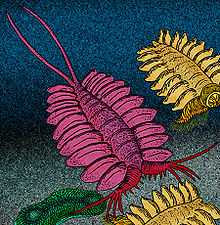Kerygmachela
| Kerygmachela Temporal range: Cambrian Stage 3 | |
|---|---|
 | |
| Kerygmachela kierkegaardi, dorsal view | |
 | |
| A colourful reconstruction of Kerygmachela | |
| Scientific classification | |
| Kingdom: | Animalia |
| Stem-group: | Arthropoda |
| Class: | †Dinocaridida |
| Order: | †Radiodonta |
| Family: | †Anomalocarididae (?) |
| Genus: | †Kerygmachela Budd, 1993 |
| Binomial name | |
| Kerygmachela kierkegaardi Budd, 1993 | |
Kerygmachela kierkegaardi was a blind nektonic organism from the Sirius Passet Lagerstätte, from Cambrian Greenland. Its anatomy strongly suggests that it, along with its relative Pambdelurion whittingtoni, was either an anomalocarid or a close relative thereof. The specific name, "kierkegaardi" honors Danish philosopher Søren Kierkegaard.[1]
It had a pair of well-developed anterior limbs that had long spines, and terminated in long, feeler-like cerci. These limbs correspond to the traditional anterior feeding-limbs of other anomalocarids. The conical mouth opens up at the very base between these two limbs. It also had 11 pairs of lateral lobes (used in swimming), along with 11 pairs of small legs at the lobes' bases, and a posterior pair of cerci.[2]
The spiny anterior limbs suggest that it may have been a predator; however, its small mouth suggests it would have been restricted to very small prey.
Further reading
- Budd, G. E. (1999), "The morphology and phylogenetic significance of Kerygmachela kierkegaardi Budd (Buen Formation, Lower Cambrian, N Greenland)", Transactions-Royal Society of Edinburgh 89: 249–290
References
- ↑ Budd, Graham E. (1993), "A Cambrian gilled lobopod from Greenland", Nature 364 (6439): 709, doi:10.1038/364709a0
- ↑ Leanchoilia guts and the interpretation of three-dimensional structures in Burgess Shale-type fossils, Paleobiology
External links
- Anomalocarid Homepage
- Palaeos